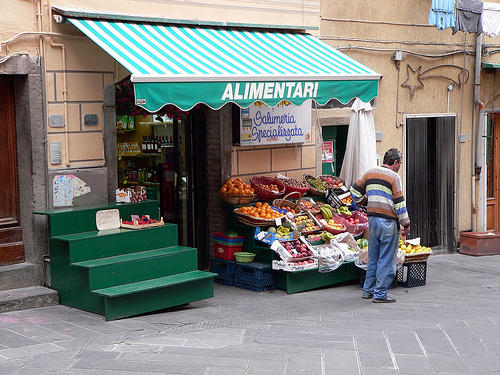Shopping - Lesson 1 - Conversation:
In un negozio di generi alimentari
(At the grocery store)
(photo
by Lee Coursey used
under terms of Creative Commons license.)

|
Signor Bianchi: |
Buon giorno, Signora Smith. Come sta? Sono subito con
Lei. Ecco, tocca a Lei. In che posso servirLa? |
|
Signora Smith: |
Ho bisogno di due bottiglie di vino Corvo, due
chili di spaghetti, ed un chilo di pane. |
|
Signor Bianchi: |
Il pane non è molto fresco. Forse è meglio dal fornaio. |
|
Signora Smith: |
Grazie, Signor Bianchi. Vorrei anche degli
affettati. |
|
Signor Bianchi: |
Surgelati o freschi? |
|
Signora Smith: |
Freschi. Un etto di proscuitto due di mortadella,
e due di salame, tre etti di burro, e due scatole di
sardine (acciughe). |
|
Signor Bianchi: |
Ecco fatto. Che altro? |
|
Signora Smith: |
Vediamo un pò. Mi dia Una dozzina di uova ed un bel pezzo di
parmigiano. Posso assaggiarlo? |
|
Signor Bianchi: |
Ecco. Le piace? |
|
Signora Smith: |
Ottimo, me ne dia mezzo chilo circa. |
|
Signor Bianchi: |
Faccio il conto? |
|
Signora Smith: |
Non ancora. Due pacchetti di caffè ed un litro
d'olio d'oliva. |
|
Signor Bianchi: |
Ecco tutto, Signora. Questo è il Suo scontrino. |
|
Signora Smith: |
Mandi la spesa a casa, per favore. Ha il mio indirizzo, vero? |
|
Signor Bianchi: |
Certamente, Signora. Grazie mille e arrivederLa |
|
Signora Smith: |
Arrivederci. |
Translation:
|
Mr. Bianchi: |
Good morning, Mrs. Smith. How
are you? I'll be right with you. -— All right, it's your turn. What can
I do for you? |
|
Mrs. Smith: |
I need two bottles of Corvo
wine, two kilos of spaghetti, and a kilo of bread. |
|
Mr. Bianchi: |
The bread is not very fresh.
Maybe it's better at the bakery. |
|
Mrs. Smith: |
Thank you, Mr. Bianchi. I would
also like some cold cuts. |
|
Mr. Bianchi: |
Quick frozen or fresh? |
|
Mrs. Smith: |
Fresh. One hundred grams of
prosciutto, two of mortadella, and two of salami, three hundred grams
of butter, and two cans of sardines. |
|
Mr. Bianchi: |
That's done. What else? |
|
Mrs. Smith: |
Let's see. Give me a dozen eggs
and a nice piece of parmesan. May I try it? |
|
Mr. Bianchi: |
Here. Do you like it? |
|
Mrs. Smith: |
Very good; give me about half a
kilo of it. |
|
Mr. Bianchi: |
[Should] I make up the bill? |
|
Mrs. Smith: |
Not yet. Two packages of coffee
and a liter of olive oil. |
|
Mr. Bianchi: |
Here's everything, ma'am. This
is your receipt. |
|
Mrs. Smith: |
Send the purchases home,
please. You have (the) my address, right? |
|
Mr. Bianchi: |
Certainly, ma'am. Many thanks,
and good-bye. |
|
Mrs. Smith: |
Good-bye. |
Notes on conversation
1.
Ho bisogno di,
literally, "I have need of."
2. Un etto, "one hundred grams;" due etti, "two hundred grams."
3. Ne, "of them," "of it."
Mi in front of ne becomes me: “me ne”.
Mi dia una dozzina di uova. "Give me a dozen eggs."
Me ne dia una dozzina. "Give me a dozen of them."
Mi dia un chilo di parmigiano. "Give me a kilo of parmesan."
Me ne dia un chilo. "Give me a kilo of it."
4. La spesa means "the shopping," "the purchase." Fare la spesa means specifically "to do the (grocery) shopping."
5. In